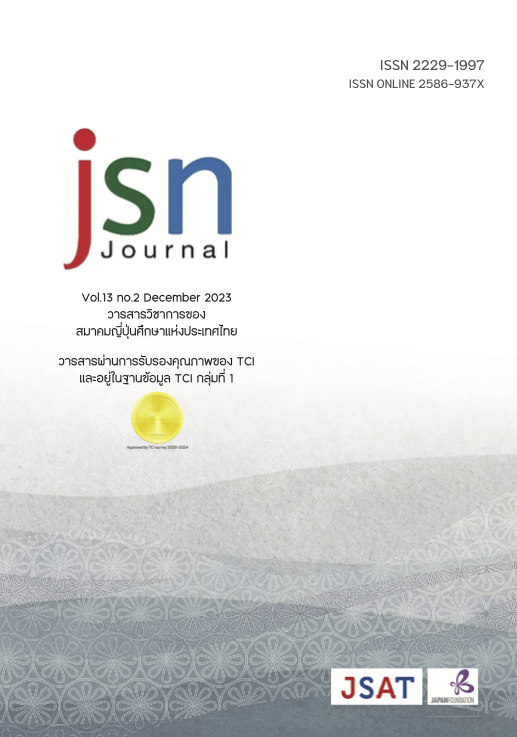Gender in the Kitchen Space: A Case Study of the Gay Characters in the Antique Bakery by Yoshinaga Fumi
Main Article Content
Abstract
This research aims 1) to study the interplay between gender and the kitchen area through a gay character and 2) to study the change in the image of the kitchen area in Japanese society through a gay character in Yoshinaga Fumi’s work by investigating 12 episodes of the anime series Antique Bakery (Seiyō Kottō Yōgashiten) (2008). This research discusses “gender” through the viewpoint of the kitchen area where it can be reflected through the gender-stated system created by society. As found from the findings, the kitchen area in the Antique Bakery anime series is played by Yusuke Ono as the chef, who is the main character of this anime series, to present gender diversity. The character in this anime presents the idea of liberation from the expectations of a patriarchal society. Gays in the kitchen area are considered unacceptable in Japanese society, while Yusuke Ono represents the image of a liberating and revealing gay person in society through the characters of pastry chefs in the kitchen area. As a result, the space in the kitchen reflects the beginning of the shift in gender roles between men and women, as it reflects gender equality in that all genders can use the kitchen area and demonstrates that the space in the kitchen cannot define the gender role to be used.
Article Details

This work is licensed under a Creative Commons Attribution-NonCommercial-NoDerivatives 4.0 International License.
ข้อความและข้อคิดเห็นต่างๆ ในบทความเป็นของผู้เขียนบทความนั้นๆ ไม่ใช่ความเห็นของกองบรรณาธิการหรือของวารสาร jsn Journal
References
กฤตพล สุธีภัทรกุล. (2563). การประกอบสร้างตัวละครชายรักชายในซีรีส์วาย.สถาบันบัณฑิตพัฒนบริหารศาสตร์.
คำนวร เขื่อนทา. (2013). ว่าด้วย เพศสภาพ เสมอภาค ภราดรภาพ. วารสารนิติสังคมศาสตร์ มหาวิทยาลัยเชียงใหม่, 6(1), 85-105.
ชัญญานุช อาสาวดีรส (2562). LGBT ในสังคมญี่ปุ่น. มหาวิทยาลัยธรรมศาสตร์.
นัทธนัย ประสานนาม. (2563). การเว้นระยะห่างทางเพศสถานะ: นวนิยายยาโออิของไทยในการเมืองเรื่องขนบวรรณกรรมกับการตีความ. วารสารศาสตร์คณะวารสารศาสตร์และสื่อสารมวลชนมหาวิทยาลัยธรรมศาสตร์, 13(3), 160-187.
ปาริชาต เซียะคง และวรเวช ว่องศิริ. (2563). เพศภาวะ : ความสัมพันธ์เชิงอำนาจในวรรณกรรมท้องถิ่นภาคใต้เรื่อง เมืองสิด(ขุนแกล้ว) แหมะเว. วารสารราชภัฏสุราษฎร์ธานี, 7(2), 26-60.
พรลภัส บุญฟัก. (2563). การปรุงอำนาจผ่านความรื่นรมย์ในการทำอาหารของผู้หญิงในภาพยนตร์. วารสารนิเทศศาสตร์และนวัตกรรมนิด้า, 7(1), 65-82.
ศิริวรรณ ปรีชานฤตย์. (2018). คิทเช่น..เป็นมากกว่าห้องครัวในนวนิยายเรื่อง คิทเช่น, วารสารเครือข่ายญี่ปุ่นศึกษา, 8(พิเศษ), 95-110.
สำนักงานราชบัณฑิตยสภา. (2561). หลักเกณฑ์การทับศัพท์ภาษาเยอรมัน สเปน ญี่ปุ่น และมลายู. ค้นจาก https://www.orst.go.th/pdfjs/web/viewer.html?file=/FILEROOMCABROYINWEBDRAWER004GENERALDATA0000/00000754.PDF
อภิญญา เฟื่องฟูสกุล. (2543). พื้นที่ในทฤษฎีสังคมศาสตร์. วารสารสังคมศาสตร์, 12(2), 65–160.
Aoyama, T. (2003). The Cooking Man in Modern Japanese Literature. In K. Louie and M. Low (Eds.) Asian Masculinities: The Meaning and Practice of Manhood in China and Japan. Routledge.
Aoyama, T. (2015). Queering the cooking man: food and gender in Yoshinaga Fumi's (BL) manga. Boys Love Manga and Beyond: History, Culture, and Community in Japan. Edited by Mark McLelland, Kazumi Nagaike, Katsuhiko Suganuma, and James Walker. University Press of Mississippi.
Matthias, T. (2020). Same-Sex Families and Legal Recognition in Europe. European Studies of Population, 24, 95–115.
McLelland, M. (2000). Male Homosexuality in Modern Japan: Cultural Myths and Social Realities. Taylor and Francis Ltd.
Steinunn Steinarsdottir. (2020). The LGBTQ+ culture and Japanese society. University of Iceland School of Humanities Japanese Language and Culture.
Xuan Bach Tran. (2018). Reading Food in Boys’ Love Manga: a Gastronomic Study of Food and Male Homosexuality in the Manga Work of Yoshinaga Fumi. AUT University, School of Hospitality and Tourism.
青山智子. (2008). 「よしながふみのマンガに見る<食>とジェンダー」『比較日本学教育研究センター研究年報』 6, 153-161.
Shibuya City Office. (2020). 「渋谷区パートナーシップ証明」 https://www.city.shibuya.tokyo.jp/kusei/shisaku/lgbt/partnership.html


